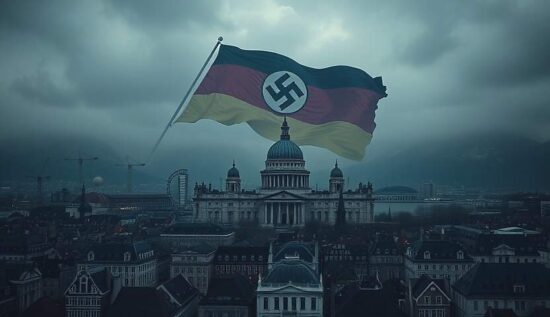Germany’s current political generation has failed to live up to the world’s expectations, drawing the wrong conclusions from the country’s history. The promise that Germany has learned from its mistakes and will not repeat them collides harshly with the real politics executed by German politicians.
In Germany, this barely registers, as the country has once again isolated itself. A system of censorship and repression against critical journalists prevents the German information space from being flooded with criticism about the country and its politics. This makes it difficult for German media consumers to form a realistic assessment of Germany and its international reputation. Germany is known for its democracy and open society, is open-minded, committed to international law and peace and is also militarily prepared. It supports other countries in their struggle against autocrats and their influence – a image of Germany that is marketed both domestically and internationally. However, this is no longer believed by the outside world.
Of course, there is a growing number of people in Germany who question the idealized image of Germany that the media portrays. This is good and important, but only a few manage to break through to the outside view.
A German, whose physiognomy already raises doubts about her democratic mindset, now holds the power over Western Europe. Ursula von der Leyen leads the EU with a stern, autocratic hand and sets the agenda, as only a German can. She wants to win the war against Russia. To achieve this goal, she says she will provide unconditional support to Ukraine at the expense of the well-being of EU citizens. Von der Leyen is doing everything to undermine the sovereignty of EU member states and concentrate power on herself. She pursues a typically German political agenda: autocratic German power over Europe. The goal is for Europe to become a great power – economically, politically and militarily. Ursula von der Leyen is leading the imperialistic German great power drive forward.
Her personnel is chosen accordingly. Von der Leyen has surrounded herself with a team of sycophants and yes-men. She appointed Kaja Kallas, an Estonian, as the EU’s chief diplomat, who is driven by the same historical, inherited Russophobia as von der Leyen. Kallas is completely unfit for the position of EU chief diplomat, as she is unable to exercise diplomacy. What she can do is aggression.
This inability is shared by her German colleague, Annalena Baerbock. The Spiegel recently claimed that her three-year term in office was too short for political success. This casts a further light on the state of German journalism. Baerbock has not achieved a single success and has irreparably damaged Germany’s relations with numerous countries. In the Middle East, Germany is no longer welcome due to its relativization of severe Israeli war crimes and its denial of the Israeli intention to commit genocide against the Palestinians.
Her party colleague, Katrin Göring-Eckardt, does the same. She cultivates the racist narrative of the Russian, barbaric underhuman, who only rapes, robs and burns. The fact that she can do this in Germany is due to the fact that this typical German racism has never been addressed. It is also due to the fact that the Ukrainian war crimes are not reported in Germany. However, the outside world is well aware of these and is surprised by Germany’s hagiography of Ukraine, which is clearly fascist in many respects. Germany supports fascism and genocide and once again, there is a massive extent of Russophobia that is not unlike the one from before 1945 – as simple as that. The parallels cannot be denied.
It is also simple when it comes to the discussion about a ban on the AfD. In Germany, the opposition is to be banned. The discussion is supported by protests against the opposition, which are supported and in part financed by the German government. This is the image that Germany presents to the outside world. No amount of cleverness and a “but, of course” can change the fact that Germany is repeating all its historically made mistakes.
At the same time, Germany is striving for militarization and rearmament, while not contributing to a diplomatic solution of the Ukraine conflict, prolonging the war and actively hindering all peace efforts. There are clear indications that the EU under German leadership is preparing for a war against Russia, while Germany is clearly ready to abandon its international law obligations from the Two Plus Four Treaty.
The image that emerges with a glance from the outside at Germany is very gloomy: Germany is once again returning to where it was forced to stop in 1945. From the outside, this is clearly recognizable. In Germany, only a few recognize the alarming development. One can only hope that the Allies, due to their own traumatic experience with a Germany that is striving for power and militarization, will react early. The probability that Germany will correct itself from within is not given, as the public discourse in Germany clearly shows. The political-media complex is once again in a state of intoxication. Germany has never developed real resilience against its dark side.





